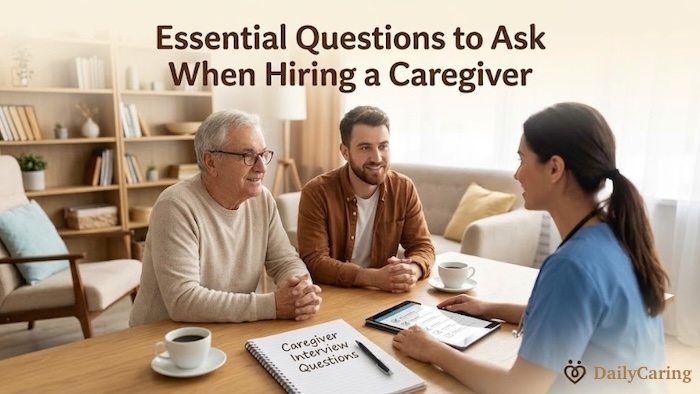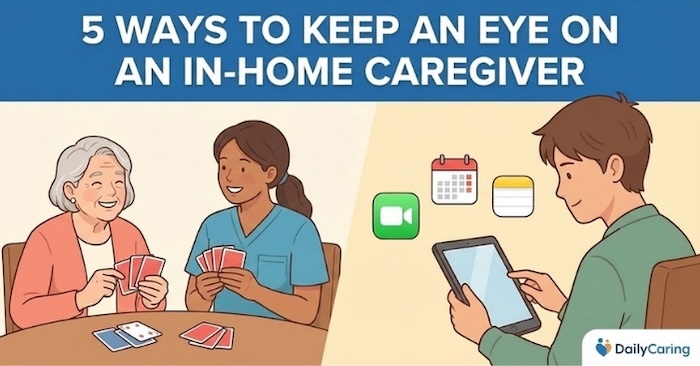Bringing a caregiver into your loved one's home is one of the most significant and personal decisions you can make. It involves inviting someone into a private space and trusting them with the health, safety, and daily happiness of someone dear to you.
Finding the right person goes beyond qualifications and checklists; it's about discovering a compassionate individual who is not only competent but also a genuine fit for your family's unique needs and personality.

To empower you in this important search, the following essential questions will guide you in conducting a thorough and insightful interview, helping you build confidence as you choose the best possible care.
How to Interview an In-Home Caregiver
When hiring a caregiver for your older adult, you’re looking for someone who will be a good fit with your older adult and the care situation in their home.
Use these interview questions as a guide for evaluating your job candidates. They'll help you find someone responsible, trustworthy, and compassionate.
You don’t have to ask all the questions, just choose the ones you feel are most important.
Interview Questions to Ask Potential Caregivers
About a Caregiver's Experience
- What experience do you have caring for someone with [describe your older adult’s health conditions]?
- What experience do you have with [ask about specific skills they’ll need, such as:]
- Bathing
- Lifting or transfer from bed to wheelchair
- Assistance with toileting
- Dressing
- Cooking
- Cleaning
- Driving
About Training and Certification
- Have you had formal caregiving training?
- Have you had CPR or first-aid training?
- What is your current health status – TB test, immunizations, etc?
- Can you provide documentation for all your training and health status?
- Are you licensed or bonded? If yes, please provide contact information so I can verify this.
About a Caregiver's References
- I like to run background and credit checks on strong candidates to ensure they’re responsible and trustworthy. Is there anything you’d like me to know before I run the check?
- Please provide your full name, address, phone number, social security number, and current photo ID
- Where was your last job? How long were you there? Why did you leave?
- May we contact your past two employers? Please provide their contact information.
About the Job Details
- What days and times are you available, and how many hours are you looking for?
- Talk about your major house rules, for example:
- We don’t allow smoking in or near the house.
- Absolutely no guests are allowed.
About the Personality Fit
- Why are you interested in this type of work?
- Look for someone who enjoys working with the elderly, or a caring, sociable, and nurturing person.
- My older adult sometimes gets cranky, says rude things, or refuses to do what they need to do. [If those examples don’t apply, describe things your older adult is likely to do.] Describe how you would handle situations like that.
Final Thoughts About Interviewing Potential Caregivers
Hiring a caregiver is a profound step that balances practical needs with deep emotional trust. The interview process you conduct sets the tone for this crucial relationship. By asking thoughtful questions about experience, training, and personal approach, you move beyond a simple hiring checklist to understand the candidate's heart and character.
Remember, the right caregiver will not only provide essential support but also become a trusted companion, bringing you peace of mind and comfort to your loved one. Let this guide give you the clarity and confidence to make a choice that ensures safety, dignity, and compassionate care every day.
Recommended for you:
- Affordable Home Care: 8 Ways to Lower Senior Care Costs
- When They Say No: 8 Ways to Introduce In-Home Care for Seniors
- 3 Tips to Choose Between Assisted Living vs In-Home Care
About the Author

Connie is the founder of DailyCaring.com and was a hands-on caregiver for her grandmother for 20 years. (Grandma made it to 101 years old!) She knows how challenging, overwhelming, and all-consuming caring for an older adult can be. She also understands the importance of support, especially in the form of practical solutions, valuable resources, and self-care tips.














[…] Have interviews with your short list of potential caregivers.Conduct face-to-face interviews with the people you consider for the job. Face-to-face interactions give you a good feel for the individual’s personality and demeanor. If possible, have your loved one participate in the interview. After all, it is their care that the individual will be handling, so they should feel comfortable with the choice. […]
[…] Have interviews with your short list of potential caregivers. Conduct face-to-face interviews with the people you consider for the job. Face-to-face interactions give you a good feel for the individual’s personality and demeanor. If possible, have your loved one participate in the interview. After all, it is their care that the individual will be handling, so they should feel comfortable with the choice. […]
[…] Have interviews with your short list of potential caregivers. Conduct face-to-face interviews with the people you consider for the job. Face-to-face interactions give you a good feel for the individual’s personality and demeanor. If possible, have your loved one participate in the interview. After all, it is their care that the individual will be handling, so they should feel comfortable with the choice. […]